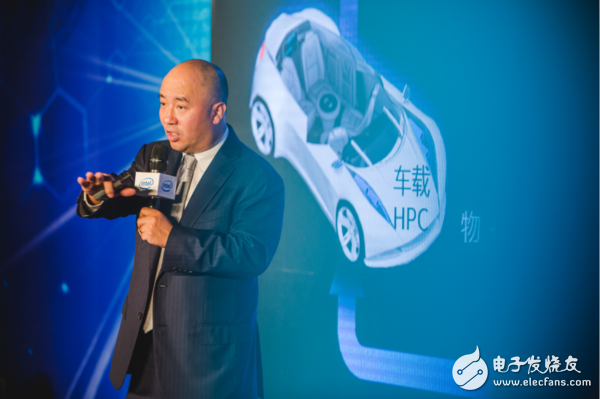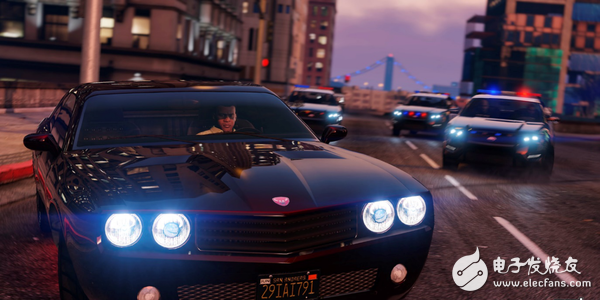Recently, Intel, a world-renowned technology giant, held an unmanned sharing salon with the theme of “The NEXT: Technology & TImes; Car†in Beijing. Through the roundtable discussion, the event shared a lot of opinions from the industry, academia and research community. At the same time, this is Intel's first systematic introduction to the company's layout and cutting-edge perspectives on the unmanned field, including its unique advantages in driving unmanned development.

Yang Xu, Global Vice President and President of Intel China
Driverlessness has become a common interest of the giants. After companies such as Google, Tesla, Baidu, Uber, and LeTV entered the market, Intel, the chip leader, gave its answer to driverless: the only end-to-end driverless solution provider in the world. In this answer, what role will Intel play in driverless driving? What does this answer mean for the giants of this computing era? The answer may be beyond the expectations of many people.

Intel and BMW, Monileye launch unmanned cooperation
Industry's first supplier of end-to-end driverless solutions
Intel does not manufacture cars by itself, but the technology and solutions it provides can transform traditional car products into new ones and protect the development of driverless technology.
Intel offers an end-to-end solution that makes the flow of technology easier and faster. A complete set of deep learning and technology integration solutions not only include traditional chip and other hardware design, but also combine cutting-edge technologies such as 5G, cloud computing, big data, and Internet of Things. These technologies accelerate the highly unmanned and fully automated unmanned The realization of driving.
Chen Wei, general manager of Intel's IoT Division China, believes that Intel's unique advantages in the driverless field are mainly in terms of computing power and load integration. These algorithms and data operations require long-term technology and Accumulation and precipitation of experience. Intel has been involved in the computing and communications industry for a long time and has achieved great success. It integrates the HMI platform and functional safety chips including 5G technology to effectively realize the structure of the unmanned overall architecture.
At the same time, it cannot be ignored that the current unmanned experience is not perfect, and there are still many problems that need to be solved. Without strong computing power, especially visual computing power, driverlessness will not be able to accurately identify the environment, or even cause an accident. Unmanned driving may be safer than humans in the future, but only if it must be able to accurately identify, judge, and make decisions. This requires powerful computing power, both local chips and high-speed networks, high-precision sensors, High-precision maps, as well as support for cloud-based artificial intelligence computing.
Song Jiqiang, dean of Intel China Research Institute, believes that artificial intelligence, including deep learning, is crucial for unmanned driving, but it still needs other levels of technology to cooperate. For example, the security issues that are currently hotly debated, in order to achieve the goal of 100% security, many boundary conditions must be considered. In other words, attention should be paid to macro data on a macro level, and small data on the micro level cannot be ignored.
Intel's ability to be an end-to-end solution provider, in addition to its core strengths in chip computing, has been linked to the diversified layout of the Internet of Things, cloud computing and artificial intelligence over the past few years. As early as 2014 IDF, Intel introduced the Edison chip for intelligent hardware, and this year will also launch Xeon Phi, an artificial intelligence chip, for companies that develop artificial intelligence technology for Baidu. The combined accumulation of these areas makes it the first giant to challenge unmanned end-to-end solutions.
At present, Intel has in-depth cooperation with automotive companies such as BMW and Mobileye to provide solutions such as in-vehicle computing, cloud and machine learning, and even high-bandwidth, low-latency connection systems, powerful memory and FPGA technology, and human-machine Interfaces, as well as security technologies. BMW's next-generation driverless car, incorporating these technologies, can more fully reflect the future development trend of smart cars.

Intel Labs Tests Driverless Using PC Masterpiece GTA5
Why is Intel so much about the driverless market?
As we all know, there is still a period of time when driverless technology is going to the market. The current investment will not bring direct economic benefits. Why is Intel going to be more eye-catching in the unmanned field?
1. The driverless market has broad prospects
The continued hot discussion of Tesla's driverless and assisted driving technology tells us that driverless driving is indeed a trend and direction worthy of effort. It is safer, more efficient, more convenient, and more environmentally friendly. It will completely change the way the world travels, making drivers a historical term and representing the future of transportation.
Yang Xu, Intel's global vice president and president of China, said that by 2025, the unmanned market will reach 42 billion US dollars, and by 2030 there will be 120 million cars using driverless technology and then by 2035. One-of-a-kind cars use driverless technology.
Such a broad market prospect represents the “The Next Big Thing†that the giants are chasing. At present, companies such as Google and Baidu have been involved in the field of driverless driving. Google has been studying in this field for many years, but the legal policy in the United States can only be carried out slowly. On the contrary, Baidu is more ambitious and hopes to achieve unmanned commercial use in 2018. However, these companies are good at upper-layer Internet technologies. The underlying technology, especially at the computing level, now requires a hardware giant to support the market. Obviously no company is better suited to do end-to-end solutions than Intel.
2. The driverless car market needs a better ecology.
In the near future, driverless technology will infiltrate all aspects of people's travel life. Not only stay in the car, but also be widely used in buses, trucks, food trucks and other vehicles. In such a large environment, driverless cars need a more complete ecosystem in hardware, software and other aspects, and this requires the joint efforts of technology companies and car manufacturers.
Intel said at its IDF conference in August this year that its unmanned business includes 19 OEMs, 9 Tier 1 projects and 59 ecosystem partners. Chen Wei, general manager of the Intel IoT Business Unit in China, said that technology companies and auto manufacturers are equal, and should be committed to tapping new partners to form a perfect auto service industry system. Zhuang Jianwei, publisher and editor-in-chief of China Auto Pictorial, also believes that automakers should cooperate more with technology companies in the future transformation path and complete the transition from product users to service industries.
3, driverless is the fulcrum of the IoT
In fact, driverlessness is only part of the IoT (Internet of Things). However, driverless technology represents the most advanced level of IoT technology, which fully reflects the outstanding research value of the field. At the same time, Intel's layout of driverless technology can also help the company to perform better in other IoT businesses.
Regarding IoT, Chen Wei, general manager of the Intel IoT Business Unit in China, has his own opinion. He believes that considering Intel has moved from the traditional EPC company to a new corporate strategy combining data center and intelligent hardware. Under this premise, infrastructure construction including manufacturing and transportation, business models represented by content interaction, and even the safety risks of drivers during driving show that the IoT era of driverless driving will create a new era. Profit point and development space.
At this year's Yunqi Conference, Intel launched the IoT, big data, drone and other related cutting-edge technology products, which is impressive. As it happens, Alibaba's YunOS is also arranging the Internet of Things, but the direction is slightly different. This may also indicate that the ultimate form of the Internet in the future may be the real IoT, Alibaba is responsible for the upper application, Intel is responsible for the underlying computing.

In the era of IoT, will Intel continue to be brilliant in the field of driverless driving?
The Internet of Things era is also known as the post-mobile Internet era. The popularity of smart phones has eliminated the time and space. People are no longer sitting in front of the computer. A small mobile phone can open a colorful Internet door anytime and anywhere. This is one of the reasons why PC dying is one after another. In this era, how to use relevant technology to solve some practical problems for people's real life has become a new direction for technology companies to think hard.
Everything is not static. As a global technology giant, Intel always grasps the future trend. It is no longer a pure chip company in the inherent conception of people, but a technology company that firmly grasps the right to speak in the front field of data, hardware, technology, etc. in the IoT era.
Driverless is a branch of Intel's IoT business unit and a pivot for Intel's IoT era. As Yang Xu envisioned, in the future, we might be able to "load" a computer in a car, and few of them use Intel's chips and technology. Perhaps the real technology is that users can not feel its own hardware, and feel the powerful experience it creates.
Therefore, Intel's vigorous development of unmanned driving is obviously related to its idea of ​​betting on the trend of the Internet of Things era. Intel has created a legend in the PC industry, is it now able to create the next legend in the driverless car industry? We may wish to wait and see.
Product features:
â– Good heat dissipation
--Blade design of copper alloy contacts,good conductivity
â– Super high impact resistance and thermal stability
--Cover pans are made of high quality polycarbonate
â– Chemical corrosion resistance
-- Fingerprint-resistant zinc plated mounting brackets
â– Grounding
--One-piece grounding design,No Load-Weather resistance
Generator TR GFCI UL,Ground Fault Circuit Interrupter TR,Generator TR GFCI UL outlet,Ground Fault Circuit Interrupter TR outlet
Hoojet Electric Appliance Co.,Ltd , https://www.hoojetgfci.com